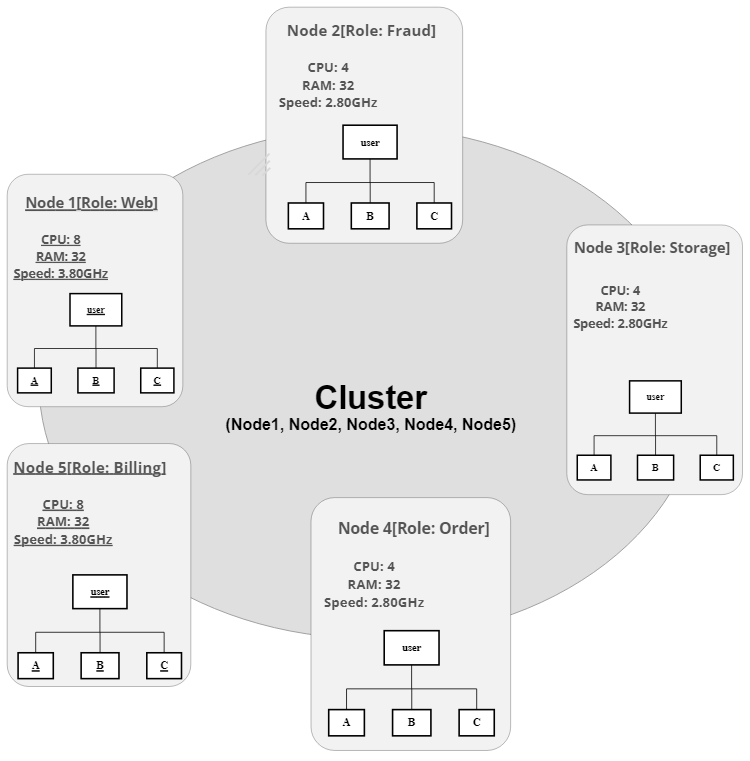Member Roles

A cluster can have multiple nodes(machines/servers/vms) with different capabilities. When you require an application to run on a node(machine/server/vm) with certain capabilities, roles helps you to distinguish the nodes so that application can be deployed on that node. Specifying cluster role(s) is a best practice; you don't want an application that requires less computational power running and consuming resources meant for a mission-critical and resource-intensive application. Even if you only have a single type of node in your cluster, you should still use roles for it so you can leverage this infrastructure as your cluster expands in the future; and they add zero overhead in any conceivable way.
How To Configure Cluster Roles
Below I will show you how the cluster above can be reproduced. I will create a five-nodes(ActorSystems - all having same name, though, but living on different machine/server/vm) cluster with different roles applied:
Node1: All of my code that receives requests from users and push same to the cluster will be deployed here!
akka
{
cluster
{
roles = ["web"]
}
}
Node2: All of my code handling fraud detections will be deployed on this node
akka
{
cluster
{
roles = ["fraud"]
}
}
Node3: All me code that retrieves, stores data will be deployed on this node
akka
{
cluster
{
roles = ["storage"]
}
}
Node4: All my code that handles customer orders will be deployed on this node
akka
{
cluster
{
roles = ["order"]
}
}
Node5: All my code that handles customer billing will be deployed on this node
akka
{
cluster
{
roles = ["billing"]
}
}
Now that we have laid the foundation for what is to follow, Akka.Cluster is made of various ready-made extensions(or modules) you can deploy. I will show you how you can deploy them on any of the nodes. Apart from the Akka.Cluster modules, if you just want to use the Akka.Cluster core, I will show you how you can deploy your own actor to the cluster node with the required role:
Cluster Sharding: Sharding be will deployed on the nodes with the order role, node4
akka
{
cluster
{
roles = ["order"]
sharding
{
role = "order"
}
}
}
Distributed Pub-Sub: DistributedPubSub will be deployed on the nodes with the web role, node1.
akka
{
cluster
{
roles = ["web"]
pub-sub
{
role = "web"
}
}
}
Distributed Data: DistributedData will be deployed on the node with the storage role, node3.
akka
{
cluster
{
roles = ["storage"]
distributed-data
{
role = "storage"
}
}
}
Cluster Singleton: To avoid over charging a customer more than once, my code will be deployed with ClusterSingleton on the node with the billing role, node5
akka
{
cluster
{
roles = ["billing"]
singleton
{
role = "billing"
}
}
}
I have one more node, node2, with nothing running in it. I will deploy my custom fraud detection code there, and the way to do that is:
var selfMember = Cluster.Get(_actorSystem).SelfMember;
if (selfMember.HasRole("fraud"))
{
context.ActorOf(Billing.Prop(), "bill-gate");
}
else
{
//sleep, probably!
}
Using the Cluster SelfMember, I am checking if the current node has the billing role and if yes, create the Billing actor.
Cluster-Aware Router
Cluster-Aware routers automate how actors are deployed on the cluster and also how messages are routed based on the role specified! Routers in Akka.NET can be either grouped or pooled and you can read up on them Routers
Router Group: I will create Cluster-Aware Router Group for all my applications above!
akka
{
actor
{
provider = "Akka.Cluster.ClusterActorRefProvider, Akka.Cluster"
deployment
{
/webdispatcher
{
router = consistent-hashing-group # routing strategy
routees.paths = ["/user/web"] # path of routee on each node
nr-of-instances = 3 # max number of total routees
cluster
{
enabled = on
use-role = "web"
}
}
/frauddispatcher
{
router = consistent-hashing-group # routing strategy
routees.paths = ["/user/fraud"] # path of routee on each node
nr-of-instances = 3 # max number of total routees
cluster
{
enabled = on
use-role = "fraud"
}
}
/billingdispatcher
{
router = consistent-hashing-group # routing strategy
routees.paths = ["/user/billing"] # path of routee on each node
nr-of-instances = 3 # max number of total routees
cluster
{
enabled = on
use-role = "billing"
}
}
/orderdispatcher
{
router = consistent-hashing-group # routing strategy
routees.paths = ["/user/order"] # path of routee on each node
nr-of-instances = 3 # max number of total routees
cluster
{
enabled = on
use-role = "order"
}
}
/storagedispatcher
{
router = consistent-hashing-group # routing strategy
routees.paths = ["/user/storage"] # path of routee on each node
nr-of-instances = 3 # max number of total routees
cluster
{
enabled = on
use-role = "storage"
}
}
}
}
}
var web = system.ActorOf<Web>("web");
var fraud = system.ActorOf<Fraud>("fraud");
var order = system.ActorOf<Order>("order");
var billing = system.ActorOf<Billing>("billing");
var storage = system.ActorOf<Storage>("storage");
var webRouter = system.ActorOf(Props.Empty.WithRouter(FromConfig.Instance),"webdispatcher");
var fraudRouter = system.ActorOf(Props.Empty.WithRouter(FromConfig.Instance),"frauddispatcher");
var orderRouter = system.ActorOf(Props.Empty.WithRouter(FromConfig.Instance),"orderdispatcher");
var billingRouter = system.ActorOf(Props.Empty.WithRouter(FromConfig.Instance),"billingdispatcher");
var storageRouter = system.ActorOf(Props.Empty.WithRouter(FromConfig.Instance),"storagedispatcher");
Router Pool: I will create Cluster-Aware Router Pool for all my applications above!
akka
{
actor
{
provider = "Akka.Cluster.ClusterActorRefProvider, Akka.Cluster"
deployment
{
/webdispatcher
{
router = round-robin-pool # routing strategy
max-nr-of-instances-per-node = 5
cluster
{
enabled = on
use-role = "web"
}
}
/frauddispatcher
{
router = round-robin-pool # routing strategy
max-nr-of-instances-per-node = 5
cluster
{
enabled = on
use-role = "fraud"
}
}
/billingdispatcher
{
router = round-robin-pool # routing strategy
max-nr-of-instances-per-node = 5
cluster
{
enabled = on
use-role = "billing"
}
}
/orderdispatcher
{
router = round-robin-pool # routing strategy
max-nr-of-instances-per-node = 5
cluster
{
enabled = on
use-role = "order"
}
}
/storagedispatcher
{
router = round-robin-pool # routing strategy
max-nr-of-instances-per-node = 5
cluster
{
enabled = on
use-role = "storage"
}
}
}
}
}
var routerProps = Props.Empty.WithRouter(FromConfig.Instance);
 Edit this page
Edit this page